Steve Pulley casually sits with his legs crossed in a tiny, dimly lit room. His physique is fit, you would never tell by looking at him that he was once a heroin addict.
Pulley is traveling on a bicycle from San Diego to Charleston, South Carolina, where he is originally from. He is promoting Collegiate Recovery Community at Georgia Southern University–a program that provides support for students in recovery from addiction who are seeking a degree in higher education.
According to Jorge Marquez, clinical counselor at the UTEP Counseling Center, plans for a recovery support program are in the works. He said part of the reason for Pulley’s visit was to provide input on the importance of starting a recovery program.
According to Pulley, 48 percent of people in treatment on a yearly basis are between 18 to 25 years of age, so the transition from treatment to academic or a professional setting needs support.
“A college campus can be a slippery environment for someone in recovery,” he said.
Pulley believes people in recovery need to be advocated for and said admission to college for persons who have been convicted of a criminal drug charge can be difficult.
“That can be pretty big road block for someone trying to recover,” he said. “Advocating for them to give them a shot if they have sought rehabilitation, that’s a huge shift.”
Pulley wants people to know that addiction is a disease that consumes the person, and he wants people to look at it that way, rather than criminalizing everyone.
“I’ve seen it affect a lot of people as far as whether they can get into a university,” he said. “I think that having as much support as possible is going to lead to success.”
Pulley sets off later today for Fort Stockton, Texas, and he will head to Houston and make one more final stop in Texas before he goes to Louisiana. He has been stopping at several schools to promote the organization.
Pulley is now 26. During his time of addiction, he had been in 10 facilities all over the country and was incarcerated several times. He also had four overdoses and was hospitalized as a result. He was 16 years old when he started, and he said his friends introduced him to it.
“In high school I was doing it, then I got introduced to doing it intravenously and it was just a downward spiral from there,” Pulley said. “It took me to want (recovery) and for my parents to stop enabling me. They gave me a trespassing warrant. I had to hit my bottom and then I realized I better get some help.”
He ended up in Louie’s House, a halfway house in Statesboro, Georgia. While he was there, he was helped to get into school and recently they helped him get into graduate school, which he will start in May. Louie’s House also sponsored Pulley’s trip, along with Willingway Hospital, another halfway house that he also attended at one point.
Pulley will start at Medical University of South Carolina and plans to get his doctorate in physical therapy. More information on Pulley and the organization may be found at ride4recovery.org.
Helen Yip may be reached at [email protected].







R Johnson • Nov 26, 2015 at 5:09 PM
This is a great encouragement to those who are currently in recovery from heroin addiction. Oftentimes it does take hitting rock bottom for the individual to choose to get help. It’s important to know that there is much help available for those who are truly seeking recovery.